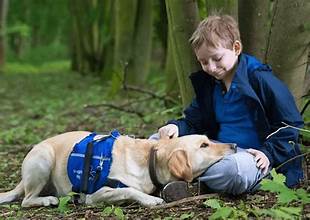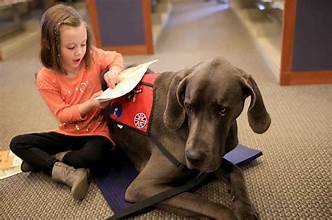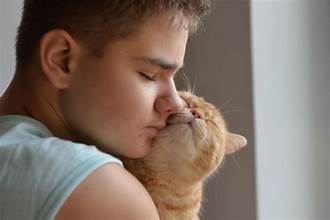How a Loyal Canine Companion Can Calm, Connect, and Empower Children with Disabilities
Children with special needs often navigate a world that feels overwhelming, unpredictable, and isolating. Whether a child is on the autism spectrum, has sensory processing challenges, or struggles with anxiety or communication delays. One of the most potent sources of comfort and connection can come from an unexpected place—a dog’s love.
The presence of a dog can transform a child’s emotional world. Here’s how these loyal companions help reduce anxiety and isolation in special needs children—and how you can foster that healing bond at home.
🐾 1. The Calming Power of a Dog’s Presence
Dogs are emotional mirrors. When they sense distress, they often respond with stillness, warmth, and quiet companionship. This simple presence can help slow racing thoughts, regulate breathing, and provide immediate comfort to a child experiencing anxiety.

- Dogs naturally decrease cortisol (stress hormone) levels.
- Their rhythmic breathing and warm bodies can help calm meltdowns or overstimulation.
- Just petting a dog has been shown to lower heart rate and blood pressure.
Example: A child who feels overwhelmed in a noisy environment may find grounding and relief by sitting beside their dog and petting its soft fur in a repetitive motion.
🧠 2. Building Confidence Through Responsibility
Children with special needs often feel a lack of control over their environment. Taking part in caring for a dog—feeding, brushing, walking—offers a sense of purpose and success.

- Dogs don’t judge; they respond to love, attention, and consistency.
- A child who may struggle socially can feel empowered and needed by their dog, fostering a sense of independence and confidence.
- This caregiving relationship boosts self-esteem and independence.
Tip: Start with small tasks and positive reinforcement. Even placing a treat in the dog’s bowl can be a meaningful ritual for a child with anxiety.
💛 3. Reducing Loneliness with Unconditional Love
Many children with disabilities face difficulty making friends or feeling understood. A dog offers something rare: affection without expectation, companionship without pressure.

- Dogs can become a child’s first best friend, especially when human friendships are complicated.
- Children may find it easier to open up emotionally when talking to or through their dog.
- Dogs often act as “social bridges” in public, helping children feel less isolated.
Example: A nonverbal child may begin expressing emotions more freely by pointing, laughing, or vocalizing when interacting with their dog.
🌿 4. Creating Predictable Comfort in an Unpredictable World
For children with special needs, routines and predictability are key. Dogs thrive on structure, which can reinforce schedules, transitions, and emotional stability for kids.
- Morning and bedtime rituals that involve the dog can make daily life more manageable.
- Dogs can serve as anchors during therapy sessions, hospital visits, or during stressful transitions.
- Their constant presence can help lessen separation anxiety and nighttime fears.
🦴 5. Encouraging Physical Activity and Play
Children with disabilities may struggle with motivation or coordination, but dogs can encourage gentle, joyful movement and play.
- Tossing a ball, walking the dog, or playing simple hide-and-seek games promote motor skills and movement.
- Dogs often inspire sensory exploration through touch, sound, and playful interaction.
- This movement also aids in reducing pent-up anxiety or hyperactivity.
Tip: Choose breed-appropriate games. A calm dog might enjoy slow walks or brushing, while a playful pup might respond to puzzle toys or training games.
🌈 A Lifeline of Love
A Transformative Love: How a Dog Can Change the Life of a Special Needs Child
When chosen with care and introduced gently, a dog can help reduce anxiety, ease social fears, and fill in the emotional gaps where traditional therapy can’t always reach.
Final Thoughts
Before making any decisions about getting a dog for a special needs child, it’s essential to consult with a professional, such as a pediatrician or a therapist, to ensure that it’s the right choice for your family. A dog’s love is simple but profound. For a special needs child, it can mean the difference between isolation and connection, fear and safety, loneliness and unconditional love. If your family is considering a dog, know that this choice—when made with understanding and support—has the potential to change your child’s life in the most beautiful and inspiring ways.




